Posts Tagged ‘disappearance’
Thursday, June 17th, 2010

interstellar tones transport Sun Ra offworld
But in reality, it is the inherent failure of representation, both in the visual and the political sense, that continually leads activist-artists to abandon their works and their familiar skills, and to dissolve once again into the intersubjective processes of society’s self-transformation.
This moment of dissolution is where one could locate exodus, not as a concept, but as a power or a myth of resistance. On the one hand, exodus is a pragmatic response to the society of control, in which any widespread political opposition becomes an object of exacting analysis for those who can afford to invest major resources in the identification, segmentation and manipulation of what we naively call the public. In the face of these strategies, exodus is a power of willful metamorphosis: the capacity for a movement to appear, to intervene and to disappear again, before changing names and recommencing the same struggle in a different way. (Brian Holmes, Unleashing the Collective Phantoms: Essays in Reverse Imagineering @ 185)
Exodus is a movement — defection from the State, exit from the state of things, toward the formation of a “new republic” (as Paolo Virno puts it). While Virno and other Italian-based theorists of the Autonomia/Operaismo movement have traced exodus as a response to the factory regime of Fordist labour that saw its dismantling in the ’70s and ’80s, Brian Holmes has placed exodus within the artistic lineage of interventions and occupations, in which the fluidity of art, and of art as an occupation or role offers an exit strategy from institutionalized engagement. Holmes’ historical references are those of the alterglobalization movement, notably the public sonic occupations of Reclaim the Streets and the deployment of carnivale tactics in general, but also in specific art projects such as Nikeground. Here, art (and the artist) move through an interzone of activism and art, a zone in which intervention and representation are no longer distinct sides or sites of the work.
(more…)
Tags: disappearance, Eshun, exodus, Holmes, Marazzi, Negri, protest, rave culture, sampling, techno
Posted in AfroFuturism, alterglobalization, art, music, philosophy, political theory | 5 Comments »
Monday, May 24th, 2010
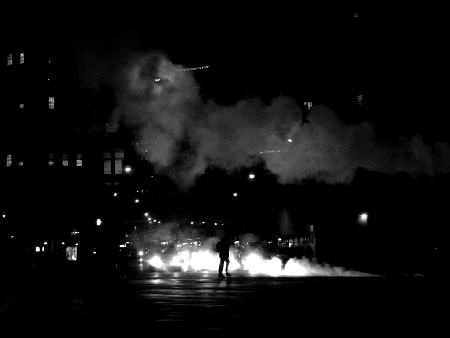
in the darkness the shapes of the light (thx to JBurke for this photo)
Excerpt from an unpublished missive — the mythus of the underground.
The outsider, insubordinate, and risk-laden character of dance, legitimated in this sense through its criminalization, provides participants with an outlaw or rebel identity forged in an ambiguous relationship with the law. — Graham St John, Technomad@20
The underground resonates with flights from the drudgery of everyday life into realms of secrecy and substance, where liberated encampments of rebel fugitives revel in the immediatism of autonomous existence…
(more…)
Tags: disappearance, exodus, TAZ, underground, Virno
Posted in alterglobalization, autonomia, philosophy, political theory | 1 Comment »
Monday, March 8th, 2010
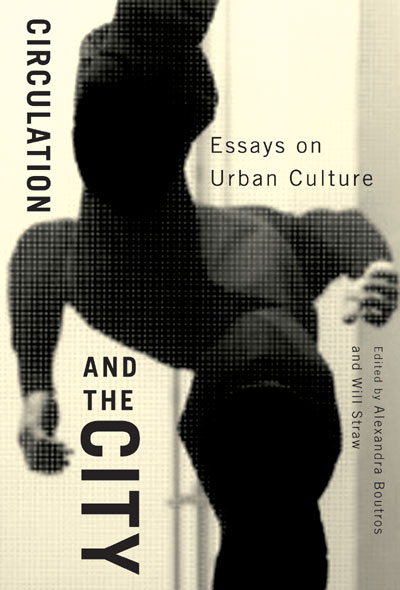
Voilà.! Some 5 years in the making, Circulation & the City.
With appropriate fanfare & deep bows, Will Straw & Alexandra Boutro’s edited volume entitled Circulation and the City: Essays on Urban Culture (McGill Queen’s UP, 2010) now graces the shelves. This book has been quite a few years in the works. The earliest drafts I have of work for the volume date back to 2005, and by the time we went to press, the final chapter I submitted on Henri Lefebre, rhythm, and revolution in the city had been transformed entirely from the words originally writ on rave culture and rhythm (funny thing: the new article I am finishing for Dancecult picks up on these earlier themes – sometimes work must encounter different sets of theoretical concepts, and years of reflection, for the excavation of the intellect to yield its bounty). The book forms the third in a trilogy of publications from the Culture of Cities Project, a multi-university research endeavour that sought to unearth “the mix of universal and local influences in the everyday life of cities,” with research concentrated in Toronto, Berlin, Dublin and Montréal, and with researchers across Canada and the Continent. So, with the intent of lurking y’all into picking this up (or perhaps unwittingly scaring you off), I offer the introduction to my chapter “Cities of Rhythm & Revolution.”
(more…)
Tags: Coming Insurrection, disappearance, exodus, Lefebvre, rave culture, rhythm, rhythmanalysis, TAZ
Posted in art, autonomia, music, philosophy, political theory, publications | 3 Comments »
Monday, January 11th, 2010
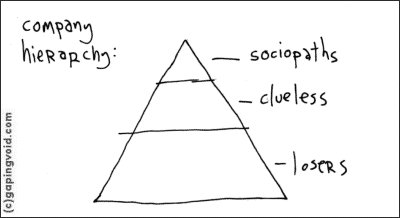
the pyramid of corporate cognitive labour
I recently came across a rather awesome analysis on Ribbonfarm that adds some much-needed complexity to the basic dichotomy between vertical and horizontal models of corporate control. These fantastic and well-writ posts (The Gervais Principle I and II) have been hit up on Slashdot and have circulated far & wide for good reason. Like Christian Marazzi’s work that deftly summarizes the significance of language to capital – the way language informs the fluctuations of the stock market and global economy (see Capital and Language) – Venkat analyses the way in which language is ab/used by particular players in corporate organisations. He deploys his deft analysis to unravel bureaucratic power principles as well as propose a theory of microclass. And he accomplishes this all by taking as his primary example the hit TV series The Office — Ricky Gervais’ brilliant satire of water cooler politics and management mediocrity. Venkat’s analysis, informed by his research into theories of corporate management, complements Marazzi’s observation that
In the post-Fordist context, in which language has become in every respect an instrument of the production of commodities and, therefore, the material condition of our very lives, the loss of the ability to speak, of the “language capacity,” means the loss of belonging in the world as such, the loss of what “communifies” the many who constitute the community. (Marazzi, Capital and Language: 131).
(more…)
Tags: anthronomics, cognitive labour, disappearance, exodus, general intellect, Marazzi, precarity
Posted in autonomia, political theory | 14 Comments »
Wednesday, December 9th, 2009
So that’s the way we live our lives. No matter how deep and fatal the loss, no matter how important the thing that’s stolen from us – that’s snatched right out of our hands – even if we are left completely changed, with only the outer layer of skin from before, we continue to play out our lives this way, in silence. We draw ever nearer to the end of our allotted span of time, bidding it farewell as it trails off behind. Repeating, often adroitly, the endless deeds of the everyday. Leaving behind a feeling of immeasurable emptiness. (Murukami, Sputnik Sweeheart 207)
…and in the Norwegian night sky, a spiral, lighting the heavens for over two minutes, what is this strange sight…
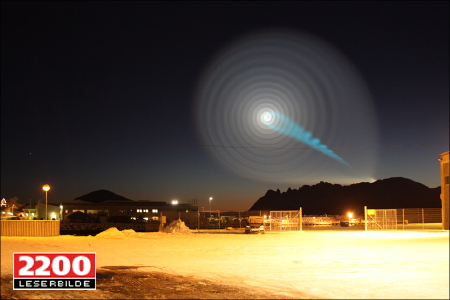
"the mysterious lysfenomen"
What gains greater notice — this spiral or the infelicities of Tiger Woods? The media attention is resolutely focused on the AfroAmerican groin as usual; the strangeness of the night sky passes us unnoticed. Perhaps because it gestures not toward what we already know – that Tiger, like 99% of us, thinks the confines of marriage a sham, and that human life be too short to not divest it among many – but toward what we don’t know. This light, the sky, these are unassimilable objects. Though reported and noticed as they do not escape all perception (that which does passes us by without a trace — perhaps), such events constitute a counter-event. A slip within symbolic systems. Such slips make possible all kinds of escapes and exit strategies.
(more…)
Tags: Antonioni, cognitive labour, disappearance, Murukami, precarity
Posted in alterglobalization, philosophy, political theory | 3 Comments »
Wednesday, November 25th, 2009

find someone to hold hands with: remember this
Not posting here registers a kind of disappearance. Where have I gone? Am I working? What constitutes labour when it is non-present? Is a life unrecorded in the 21C a life lived? Does not the precariat, the precarious immaterial class, take as much time archiving as doing? What precisely is the measure of this distance between doing and recording, acting and archiving? A desire to be done with it, enough with it, competes against the same urge to document. We are all tourists now: tourists, becoming a tourist, was the first manifestation of pathological levels of documentation. All must be photographed, recorded; the lived experience is better — oh, but isn’t it — in the re-telling than the actuality. The banality of “postmodern” readings (and this remains the ugly legacy of postmodernism) celebrated the retelling over the actuality. What is the actuality? So easy to diss this concept of lived experience – but in the critical deconstruction of presence, what the imitators forgot was the actuality or lived experience of thinking without a master. Actuality is living without a master. Writing is living too — but without a master. The only master being the master to take apart within the self (yes: this be alterity, otherness). Postmodernism found the easy-way out by generating endless critique of the lived plenitude instead of seeking its own experience thereof. Lived experience as the repetition of plenitude and suffering is the basis of anarchic living: organisation without mastery. And this concept has much more to do with the deconstruction of presence than the mere dialectical reversal of retelling over doing.
(more…)
Tags: cognitive labour, Coming Insurrection, disappearance, Marazzi
Posted in autonomia, philosophy, political theory | 3 Comments »
Monday, October 26th, 2009
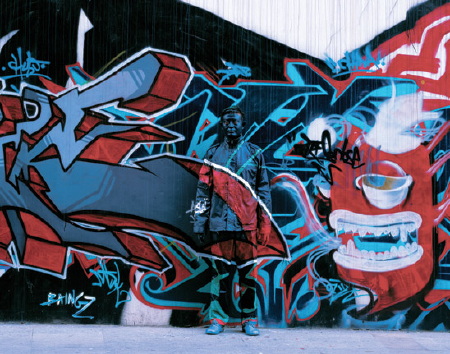
Hiding within Signs (Liu Bolin)
Disappearance as a strategy: to flee confinement by way of a slippage between sign and symbol. As enacted in space, through time. Rave culture enacts a level of disappearance, by slipping away from the usual concept of a counterculture’s visual opposition. The visual is switched for the sonic. The punk on the streetcorner for the raver in the warehouse. Rave culture switches day for night. It doesn’t disappear from the day as it was never there.
(more…)
Tags: disappearance, Liu Bolin, rave culture
Posted in art, philosophy, political theory | 6 Comments »












 RT
RT 